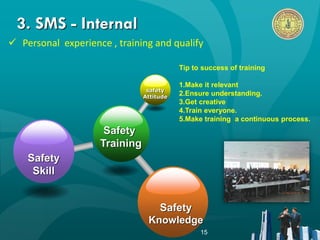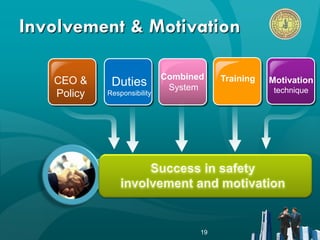Occupational Health & Safety Management System 01
- 1. Occupational Health & Safety Management system By Ms.Yaowaluk Yuangsoi May 2015
- 2. OHS Management NAME : Yaowaluk Yuangsoi NICKNAME : Nai (ไหน ) EDUCATION : OHSAS 18001 Lead auditor & auditor from BSI . 2010 -2012 Master of Engineering (Safety Engineer) Faculty of Engineering, Kasetsart University. 1997- 2001 Bachelor’s degree of Science in Industrial Hygiene and safety (B.Sc.) Burapha University. WOKRING EXPERIENCE : Over 15 years in EHS experience. ● Sep 2012 – Present : Environmental Health & safety Manager International Refreshment (Thailand) Co.,Ltd. ● Mar 2008 – Sep 2012 : Health and safety Advisor Fisher Paykel Appliances (Thailand) Co., Ltd ● Jan 2006 – Feb 2008 : Safety and Training (HRD) Supervisor Electrolux Thailand Co., Ltd.2 Personal Profile
- 3. OHS Management ● Name …………………. ● Nickname …………………. ● Position …………………. ● Working company …………………. ● Study Expectation …………………. ● Future Expectation …………………. 3 Know each other Introduce your self
- 4. 44 Contents 2. Safety Management System (SMS) 3. SMS - Internal 5. SMS - Upgrading 1. Introduction 4. SMS - External 6. Conclusion 7. Summary
- 5. 55 1.Introduction Concept of Safety Management System Old Safety • Focus on major injuried & death. • Accident cause from be careless. • Focus on corrective action. •Top down management. • Safety is safety people response • Safety is 1st priority • No loss expense evaluate. • Pay more attention at major accident . Modern Safety • Focus on all loss accident • Accident cause from management system fail. • Focus on preventive action. • Bottom up management. (All employee Involvement) • Safety is every one response • Safety is core value . • Loss economy evaluate. • Pay more attention at minor and major accident .
- 6. 66 Who shall response for safety ? Everyone’s Responsibility The best safety and health management systems involve employees at every level of the organization 1.Introduction
- 7. 77 1. Introduction Definition 1 is provides the means through which workers develop and express their own commitment to safety and health system. 2 is motivating employees to participate in the company's safety programs is crucial in the maintenance of a safe and proficient working atmosphere. Safety motivation
- 8. 88 2.Safety Management System Upgrading Internal ExternalIntegrated
- 9. 99 3. SMS - Internal Safety policy , standard , principle . Structure & Responsibility . Personal experience , training and qualify Involvement & Motivation Safe place of work Safe system of work Operation activity & Support service Accident & Incident investigation Emergency Response & Preparedness
- 10. 10 CEO & top management is the key person to support and drive safety in the organization be success. Safety policy , standard , principle . EHS ROLE MODEL 3. SMS - Internal
- 11. 11 Monitoring • Review safety annually report • Review on management review. Safety Response • Understand & recognize the important of safety • Generate clear policy and distribute Safety Action • Support all safety activities •Policy authorized Made safety objective & goal • Clearly safety commitment Safety Accountability • Compared company incidence rate to industry rate •Provide direct financial losses that can be plotted to establish loss trends • CEO & top management Safety policy , standard , principle . 3. SMS - Internal
- 12. Aim • Involve everyone in safety effort. • Cover involvement and consultation. 12 Safety Policy Property • Clear unequivocal commitment to safety • Appropriated to organization • Authorized by CEO or Top management . Monitor • Audits • Reviewing Report • Incident Investigations. Communicate • Post on notice boards . • Site meeting • Intranet system • Training Safety policy , standard , principle . 3. SMS - Internal
- 13. 13 The organization should be assignment safety responsible for all employee level. Manger Supervisor Employee Safety Assure implementation of safety work processes in plant EHS policy implementation at the plant . Implementation of time & resource for local EHS training, inspections, and other EHS program requirements. Hiring personnel accordance to EHS requirements. Supervising for implementation of EHS program into the work process according to the freedoms and restrictions provided by the plant manager Working in a manner that complies with the company EHS policies Prevents self- inflicted injury or injury to others Involve with safety programme. Suggestion and report about safety Administration of the EHS program Maintenance of EHS policies that meet regulatory compliance Effective communication of incident trends, regulatory changes, best practices Structure & Responsibility . 3. SMS - Internal
- 14. 14 Safety Committee Role & Response Law Required 1. Safety policy , plan both of inside - outside work. 2. Recommendations and report or corrective action and improvement about OHSE according safety law. 3. Encourage OHSE company activity. 4. Recommendations about Safety regulation, manual and standard. 5. OHSE and accident statistic. Survey & audit 1 time/month by create criteria, paper sheet and system . 6. To make recommendations about safety training project for all employee. 7. Prepare unsafe condition report system for all employee level. 8. Follow up safety issue after send to employer. 9. Yearly safety activity report include problem and other suggestion to employer. 10.Evaluate safety yearly activities of company 11.Other OSHE assignment from employer. Company system A. Safety Area Management - Manage equipment and record. - Maintain Evacuation Floor Plan ,First Aid Kit. - Complete risk assessments & implement corrective actions - Conduct area safety meetings when required. B. Safety Training and Induction - Safety induction of new staff. - Communicate specific safety requirements PPE - Consult with other specialists to ensure safety key points are up-to-date on all training procedures. - Manage safety training which could include coordination of F&P MSDS, crane/forklift training ,etc, or facilitation of specific safety courses for the area, and record keeping C. Safety Audits - Coordination of noise surveys - Regularly review current safety requirements - Responsible for ensuring safety audits are carried out. Structure & Responsibility . 3. SMS - Internal
- 15. 15 Safety Training safety Attitude Safety Skill Safety Knowledge Tip to success of training 1.Make it relevant 2.Ensure understanding. 3.Get creative 4.Train everyone. 5.Make training a continuous process. Personal experience , training and qualify 3. SMS - Internal
- 16. 16 Involvement & Motivation 3. SMS - Internal Participation increase “ OWNERSHIP “ It’s can reduce Risk , Major incident onsite Open discussion in the class room
- 18. 18 Motivation in organization CEO and Manger Submitted safety annual report. Prepare safety investment proposal with benefit to cost of safety project. Invite to joint safety activities. Supervisor Assign safety job as part of work Independent to control and make safety decision Assign them do safety project . Operation staff Communicate all safety concern . Assign responsibility Grant authority Fix accountability Safety committee Give the reward Grant authority Give them more opportunity about job Motivation
- 19. 19 Involvement & Motivation Motivation technique Combined System CEO & Policy Duties Responsibility Training
- 20. 20 Safety committee election Count the scoreApplication & Campaign Election process Involvement & Motivation
- 21. 21 3. SMS - Internal Safe place of work • The design & construction of facility. • Commissioning & Operation. • Modification of Facilities. • Safe mean of access & Egress in normal & emergency operation . • Design Environmental load & Hazards. • Safety assessment technique. • Inspection & Audit programmed. • Etc.
- 22. 22 3. SMS - Internal Safe system of work • Procedure (Operation & Maintenance) • Permit to work system . • Isolation Standard. • Safety Procedure • Industrial Hygiene procedure. Safe System of Work Personnel Working Env Procedure Supervision Permit
- 23. 23 3. SMS - Internal Operation activity & Support service • SMS must apply to all activity carried out by the company and all phase of project .
- 24. 24 3. SMS - Internal Accident & Incident investigation • Reporting occurrence. • Ensuring that the agreed recommendations are implemented • Training of personal in accident / incident investigation. • Dissemination of the lessons learn to other facilities & industry as a whole. • Analyzing the occurrences to identify trends and problem areas .
- 25. 2525 3.SMS - Internal Emergency Response & Preparedness • Type of emergency • Emergency Management • Severity of Emergency . • Facility Emergency Procedure • Facility Management Personal Plans • Corporate & Company Emergency Response plan. • Physical Preparation such as process hazard mgt , fire protection programed , toxic material protection , emergency alarm , emergency shut down , emergency response center , evacuation , public relation , community relation . • Post incident Recovery • Training , Drills and Exercise
- 26. 4. SMS - External Selection and control contractors. Report & Liaison to regulatory authority Interface with Emergency Service Interface with media & Public
- 27. 2727 5.SMS - Upgrading Monitoring & Internal audit Independent auditing Systematic reappraisal & Development of SMS Corrective & Preventive action .
- 28. 2828 6. Conclusion • Main benefit in producing an SMS is the process of it’s production and not document it’s self . • SMS is the way that the company mange safe and how well this is implemented is judged by Employee Competitor Authorities • The variable to success on SMS are Human Factors Quality of management Self-Regulation • Success on SMS is decision by everyone understands, believes and follow . The most important variable of SMS.
- 29. 29 7.Summary
- 30. 30 7.Summary Establishing the Basics H&S Standards Analysis & Problem Solving Becomes a Shared Responsibility






























